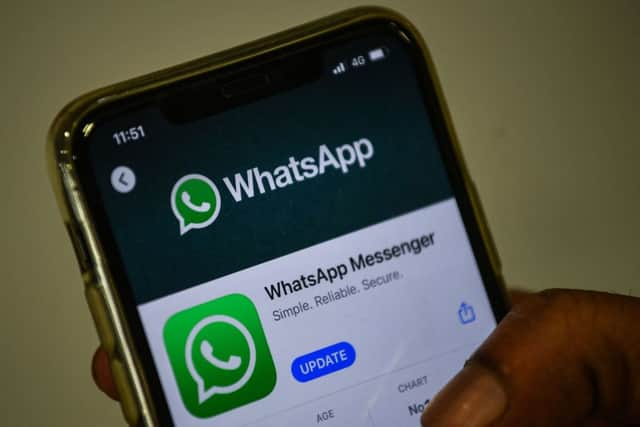WhatsApp: why messenger app could soon be illegal in UK under Online Safety Bill proposals
and live on Freeview channel 276
WhatsApp could soon be banned in the UK due to requirements of the government’s Online Safety Bill, the app’s boss has warned.
Under the upcoming Online Safety Bill, WhatsApp, along with other social media platforms, could be forced to weaken its end-to-end encryption system, which is currently used to ensure the privacy of users’ messages. The government has said this is necessary to protect children from illegal content.
Advertisement
Hide AdAdvertisement
Hide AdBut the app’s head Will Cathcart has said he will refuse to comply with this if asked, describing the bill as the most “concerning” piece of legislation currently being discussed in the western world. This means that Meta-owned WhatsApp - the most popular messaging platform in the UK - could be banned entirely within the country.
What is end-to-end encryption?
End-to-end encryption secures messages by ensuring that only those sending and receiving them can read them. Even the company running the service cannot view the contents of users’ exchanges.
This means that as a message travels to its destination, it cannot be read or tampered with by an external entity - such as a hacker. Apps such as WhatsApp, Facebook and Zoom all employ this feature.


What could the Online Safety Bill change?
Ministers want to make changes to encryption systems on social media via their new Online Safety Bill, which is currently making its way through Parliament. Under this legislation, the government would be able to demand apps weaken encryption - so that messages can be scanned for material relating to things such as child sexual abuse or terrorism.
Advertisement
Hide AdAdvertisement
Hide AdThis has long been campaigned for by prominent child-protection charities, such as the National Society for the Prevention of Cruelty to Children (NSPCC). The charity’s chief Richard Collard has said the bill “will rightly make it a legal requirement for platforms to identify and disrupt child sexual abuse taking place on their sites and services.”
This, he argued, is necessary now more than ever - pointing to research which demonstrates that the number of grooming and child-image-abuse crimes have increased dramatically in the UK. “Experts have demonstrated that it’s possible to tackle child-abuse material and grooming in end-to-end encrypted environments,” Mr Collard concluded.
A Home Office spokesperson added: “It is important that technology companies make every effort to ensure that their platforms do not become a breeding ground for paedophiles.”
What has WhatsApp said?
WhatsApp has argued that weakening encryption would undermine the security of users’ messages, leaving them vulnerable to threats such as hacking. This is something WhatsApp will refuse to compromise on, it said.
Advertisement
Hide AdAdvertisement
Hide AdMr Cathcart has also raised concerns about people’s freedom online, commenting: “It’s a remarkable thing to think about. I don’t know that people want to live in a world where to communicate privately to someone it has to be illegal.”
He added that WhatsApp had only previously faced this issue in “governments that were trying to crack down on their citizens’ ability to communicate freely”, such as Iran, where the app is now banned. He said a concern of his would be, if the UK were to push for such changes, would this prompt other countries to do the same - but with more malicious intentions?
“When a liberal democracy says, ‘is it okay to scan everyone’s private communication for illegal content?’,” he explained, “that emboldens countries around the world that have very different definitions of illegal content to propose the same thing.”
What has the government said?
The UK government, alongside campaigners such as Ian Russell, father of schoolgirl Molly Russell, who an inquest ruled died from the “negative effects of online content”, has argued that it is possible to have both privacy and child safety.
A spokesperson said: “The Online Safety Bill does not represent a ban on end-to-end encryption. It is not a choice between privacy or child safety - we can and we must have both.”
Comment Guidelines
National World encourages reader discussion on our stories. User feedback, insights and back-and-forth exchanges add a rich layer of context to reporting. Please review our Community Guidelines before commenting.
